Report on Professional Practices in Education and Training
VerifiedAdded on 2023/01/04
|20
|5984
|74
Report
AI Summary
This report delves into the multifaceted realm of professional practices within the education and training sector. It commences by defining professionalism and dual professionalism, elucidating how personal values influence practical applications within a specialized area. The report then investigates the impact of social, political, and economic factors on education policy, analyzing how current policies shape curriculum and practice. It further explores the roles of various stakeholders and external bodies, examining their influence on accountability, curriculum design, assessment, and delivery. The report also covers organizational needs, policies, and codes of practice. Finally, it evaluates quality improvement and assurance arrangements, including self-assessment, self-evaluation, and the quality cycle, while identifying areas for improvement within learning programs. The report uses the author's experience as a learning support associate to illustrate the practical application of these concepts and principles.
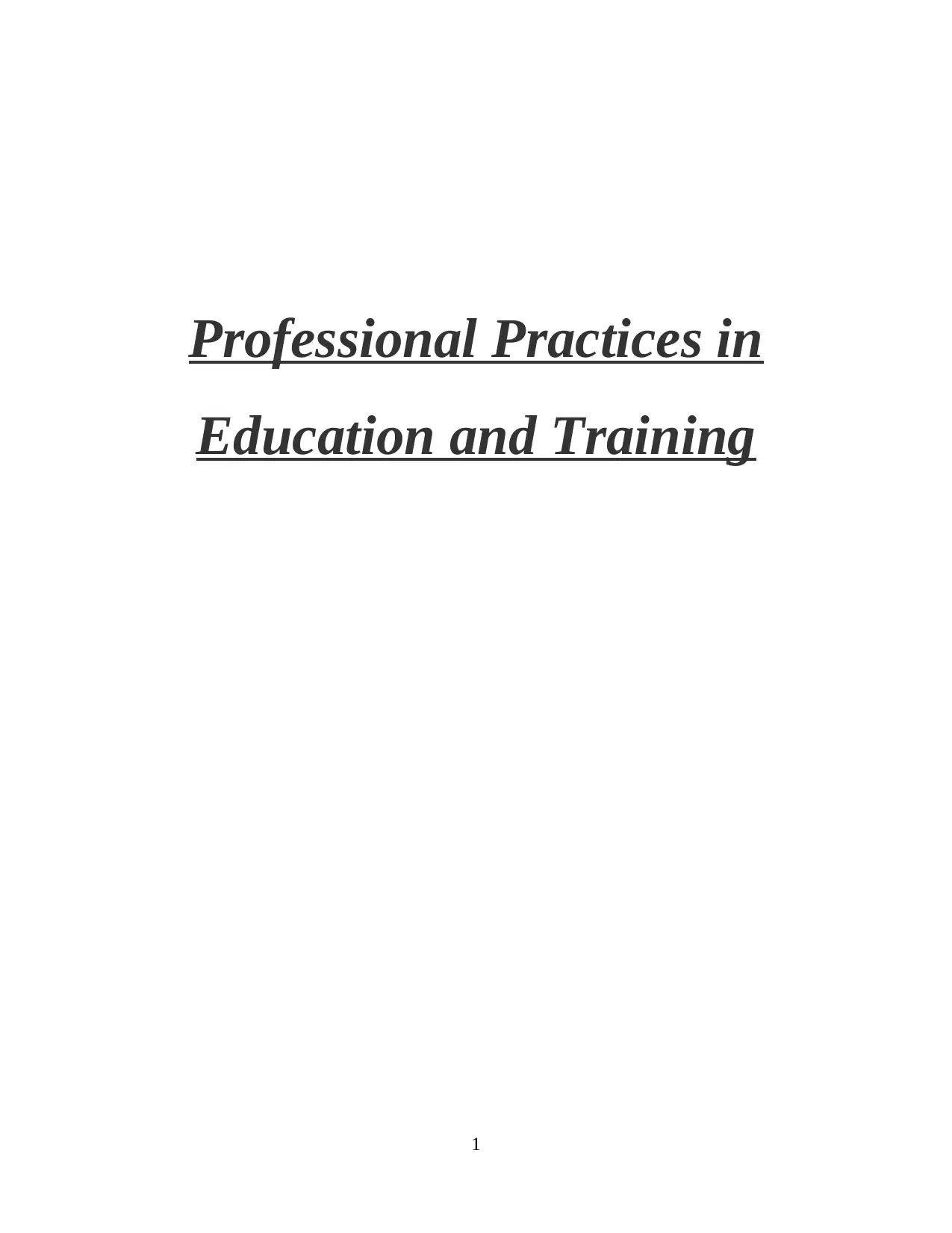
Professional Practices in
Education and Training
1
Education and Training
1
Paraphrase This Document
Need a fresh take? Get an instant paraphrase of this document with our AI Paraphraser
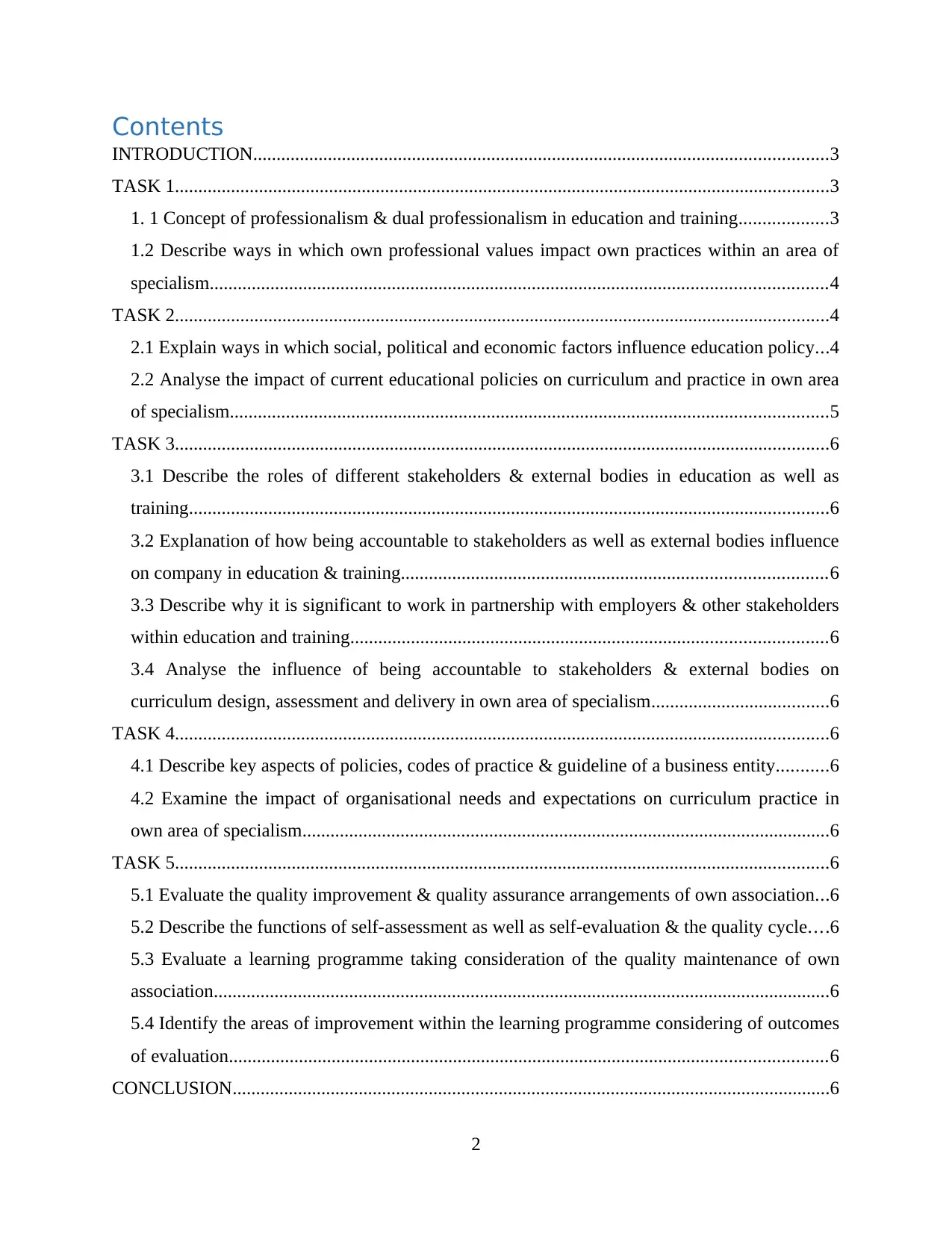
Contents
INTRODUCTION...........................................................................................................................3
TASK 1............................................................................................................................................3
1. 1 Concept of professionalism & dual professionalism in education and training...................3
1.2 Describe ways in which own professional values impact own practices within an area of
specialism....................................................................................................................................4
TASK 2............................................................................................................................................4
2.1 Explain ways in which social, political and economic factors influence education policy...4
2.2 Analyse the impact of current educational policies on curriculum and practice in own area
of specialism................................................................................................................................5
TASK 3............................................................................................................................................6
3.1 Describe the roles of different stakeholders & external bodies in education as well as
training.........................................................................................................................................6
3.2 Explanation of how being accountable to stakeholders as well as external bodies influence
on company in education & training...........................................................................................6
3.3 Describe why it is significant to work in partnership with employers & other stakeholders
within education and training......................................................................................................6
3.4 Analyse the influence of being accountable to stakeholders & external bodies on
curriculum design, assessment and delivery in own area of specialism......................................6
TASK 4............................................................................................................................................6
4.1 Describe key aspects of policies, codes of practice & guideline of a business entity...........6
4.2 Examine the impact of organisational needs and expectations on curriculum practice in
own area of specialism.................................................................................................................6
TASK 5............................................................................................................................................6
5.1 Evaluate the quality improvement & quality assurance arrangements of own association...6
5.2 Describe the functions of self-assessment as well as self-evaluation & the quality cycle....6
5.3 Evaluate a learning programme taking consideration of the quality maintenance of own
association....................................................................................................................................6
5.4 Identify the areas of improvement within the learning programme considering of outcomes
of evaluation................................................................................................................................6
CONCLUSION................................................................................................................................6
2
INTRODUCTION...........................................................................................................................3
TASK 1............................................................................................................................................3
1. 1 Concept of professionalism & dual professionalism in education and training...................3
1.2 Describe ways in which own professional values impact own practices within an area of
specialism....................................................................................................................................4
TASK 2............................................................................................................................................4
2.1 Explain ways in which social, political and economic factors influence education policy...4
2.2 Analyse the impact of current educational policies on curriculum and practice in own area
of specialism................................................................................................................................5
TASK 3............................................................................................................................................6
3.1 Describe the roles of different stakeholders & external bodies in education as well as
training.........................................................................................................................................6
3.2 Explanation of how being accountable to stakeholders as well as external bodies influence
on company in education & training...........................................................................................6
3.3 Describe why it is significant to work in partnership with employers & other stakeholders
within education and training......................................................................................................6
3.4 Analyse the influence of being accountable to stakeholders & external bodies on
curriculum design, assessment and delivery in own area of specialism......................................6
TASK 4............................................................................................................................................6
4.1 Describe key aspects of policies, codes of practice & guideline of a business entity...........6
4.2 Examine the impact of organisational needs and expectations on curriculum practice in
own area of specialism.................................................................................................................6
TASK 5............................................................................................................................................6
5.1 Evaluate the quality improvement & quality assurance arrangements of own association...6
5.2 Describe the functions of self-assessment as well as self-evaluation & the quality cycle....6
5.3 Evaluate a learning programme taking consideration of the quality maintenance of own
association....................................................................................................................................6
5.4 Identify the areas of improvement within the learning programme considering of outcomes
of evaluation................................................................................................................................6
CONCLUSION................................................................................................................................6
2

REFERENCES................................................................................................................................7
3
3
⊘ This is a preview!⊘
Do you want full access?
Subscribe today to unlock all pages.

Trusted by 1+ million students worldwide
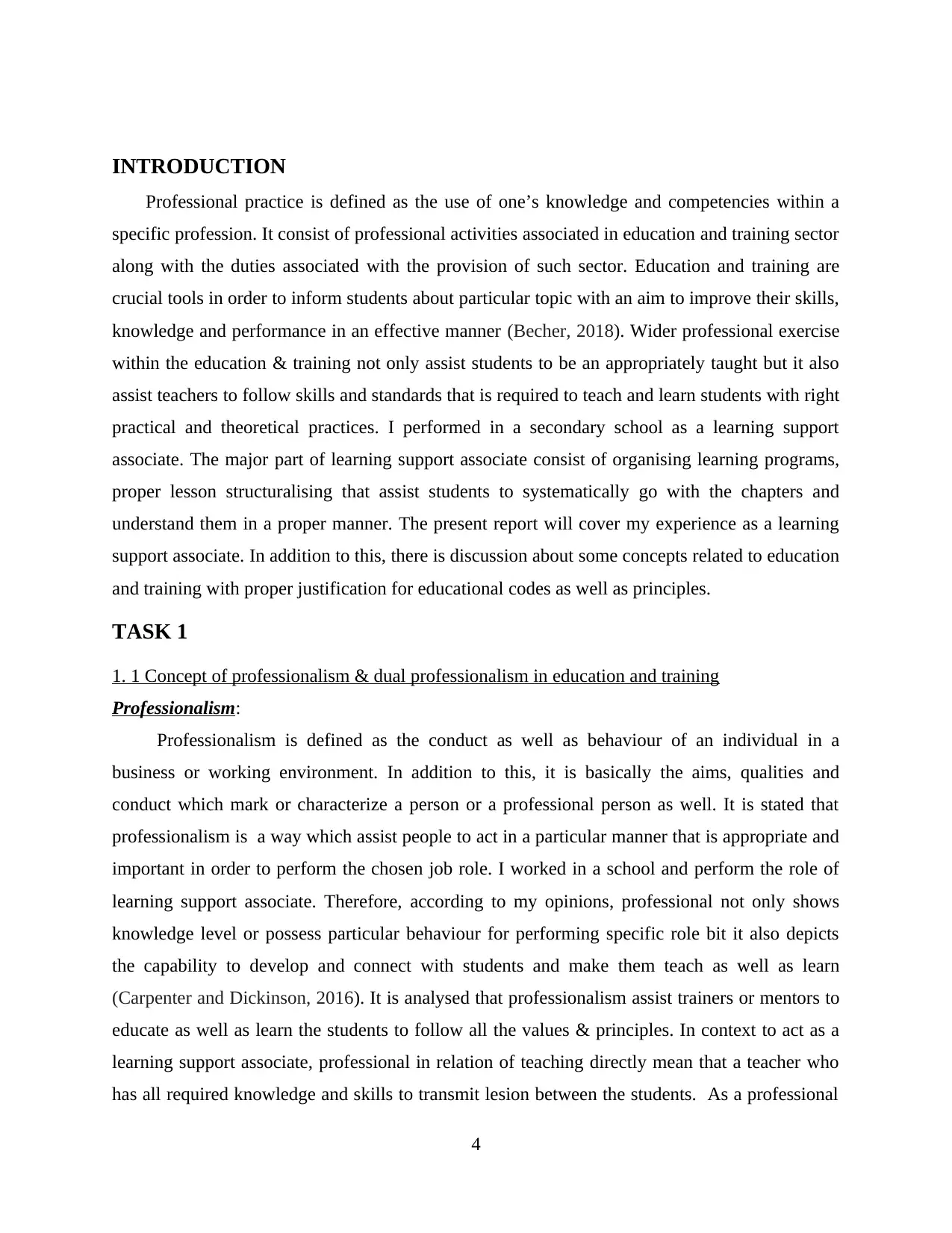
INTRODUCTION
Professional practice is defined as the use of one’s knowledge and competencies within a
specific profession. It consist of professional activities associated in education and training sector
along with the duties associated with the provision of such sector. Education and training are
crucial tools in order to inform students about particular topic with an aim to improve their skills,
knowledge and performance in an effective manner (Becher, 2018). Wider professional exercise
within the education & training not only assist students to be an appropriately taught but it also
assist teachers to follow skills and standards that is required to teach and learn students with right
practical and theoretical practices. I performed in a secondary school as a learning support
associate. The major part of learning support associate consist of organising learning programs,
proper lesson structuralising that assist students to systematically go with the chapters and
understand them in a proper manner. The present report will cover my experience as a learning
support associate. In addition to this, there is discussion about some concepts related to education
and training with proper justification for educational codes as well as principles.
TASK 1
1. 1 Concept of professionalism & dual professionalism in education and training
Professionalism:
Professionalism is defined as the conduct as well as behaviour of an individual in a
business or working environment. In addition to this, it is basically the aims, qualities and
conduct which mark or characterize a person or a professional person as well. It is stated that
professionalism is a way which assist people to act in a particular manner that is appropriate and
important in order to perform the chosen job role. I worked in a school and perform the role of
learning support associate. Therefore, according to my opinions, professional not only shows
knowledge level or possess particular behaviour for performing specific role bit it also depicts
the capability to develop and connect with students and make them teach as well as learn
(Carpenter and Dickinson, 2016). It is analysed that professionalism assist trainers or mentors to
educate as well as learn the students to follow all the values & principles. In context to act as a
learning support associate, professional in relation of teaching directly mean that a teacher who
has all required knowledge and skills to transmit lesion between the students. As a professional
4
Professional practice is defined as the use of one’s knowledge and competencies within a
specific profession. It consist of professional activities associated in education and training sector
along with the duties associated with the provision of such sector. Education and training are
crucial tools in order to inform students about particular topic with an aim to improve their skills,
knowledge and performance in an effective manner (Becher, 2018). Wider professional exercise
within the education & training not only assist students to be an appropriately taught but it also
assist teachers to follow skills and standards that is required to teach and learn students with right
practical and theoretical practices. I performed in a secondary school as a learning support
associate. The major part of learning support associate consist of organising learning programs,
proper lesson structuralising that assist students to systematically go with the chapters and
understand them in a proper manner. The present report will cover my experience as a learning
support associate. In addition to this, there is discussion about some concepts related to education
and training with proper justification for educational codes as well as principles.
TASK 1
1. 1 Concept of professionalism & dual professionalism in education and training
Professionalism:
Professionalism is defined as the conduct as well as behaviour of an individual in a
business or working environment. In addition to this, it is basically the aims, qualities and
conduct which mark or characterize a person or a professional person as well. It is stated that
professionalism is a way which assist people to act in a particular manner that is appropriate and
important in order to perform the chosen job role. I worked in a school and perform the role of
learning support associate. Therefore, according to my opinions, professional not only shows
knowledge level or possess particular behaviour for performing specific role bit it also depicts
the capability to develop and connect with students and make them teach as well as learn
(Carpenter and Dickinson, 2016). It is analysed that professionalism assist trainers or mentors to
educate as well as learn the students to follow all the values & principles. In context to act as a
learning support associate, professional in relation of teaching directly mean that a teacher who
has all required knowledge and skills to transmit lesion between the students. As a professional
4
Paraphrase This Document
Need a fresh take? Get an instant paraphrase of this document with our AI Paraphraser
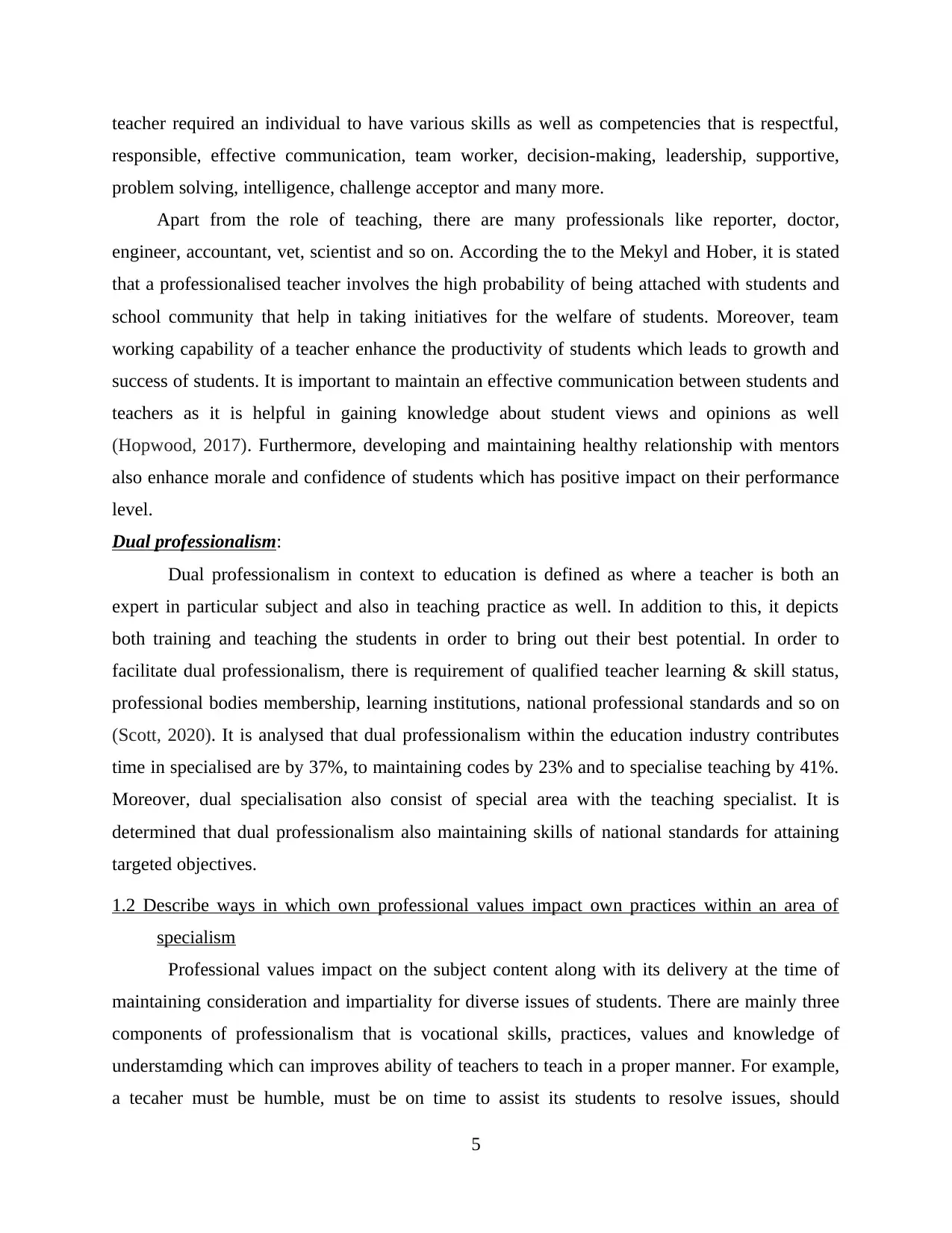
teacher required an individual to have various skills as well as competencies that is respectful,
responsible, effective communication, team worker, decision-making, leadership, supportive,
problem solving, intelligence, challenge acceptor and many more.
Apart from the role of teaching, there are many professionals like reporter, doctor,
engineer, accountant, vet, scientist and so on. According the to the Mekyl and Hober, it is stated
that a professionalised teacher involves the high probability of being attached with students and
school community that help in taking initiatives for the welfare of students. Moreover, team
working capability of a teacher enhance the productivity of students which leads to growth and
success of students. It is important to maintain an effective communication between students and
teachers as it is helpful in gaining knowledge about student views and opinions as well
(Hopwood, 2017). Furthermore, developing and maintaining healthy relationship with mentors
also enhance morale and confidence of students which has positive impact on their performance
level.
Dual professionalism:
Dual professionalism in context to education is defined as where a teacher is both an
expert in particular subject and also in teaching practice as well. In addition to this, it depicts
both training and teaching the students in order to bring out their best potential. In order to
facilitate dual professionalism, there is requirement of qualified teacher learning & skill status,
professional bodies membership, learning institutions, national professional standards and so on
(Scott, 2020). It is analysed that dual professionalism within the education industry contributes
time in specialised are by 37%, to maintaining codes by 23% and to specialise teaching by 41%.
Moreover, dual specialisation also consist of special area with the teaching specialist. It is
determined that dual professionalism also maintaining skills of national standards for attaining
targeted objectives.
1.2 Describe ways in which own professional values impact own practices within an area of
specialism
Professional values impact on the subject content along with its delivery at the time of
maintaining consideration and impartiality for diverse issues of students. There are mainly three
components of professionalism that is vocational skills, practices, values and knowledge of
understamding which can improves ability of teachers to teach in a proper manner. For example,
a tecaher must be humble, must be on time to assist its students to resolve issues, should
5
responsible, effective communication, team worker, decision-making, leadership, supportive,
problem solving, intelligence, challenge acceptor and many more.
Apart from the role of teaching, there are many professionals like reporter, doctor,
engineer, accountant, vet, scientist and so on. According the to the Mekyl and Hober, it is stated
that a professionalised teacher involves the high probability of being attached with students and
school community that help in taking initiatives for the welfare of students. Moreover, team
working capability of a teacher enhance the productivity of students which leads to growth and
success of students. It is important to maintain an effective communication between students and
teachers as it is helpful in gaining knowledge about student views and opinions as well
(Hopwood, 2017). Furthermore, developing and maintaining healthy relationship with mentors
also enhance morale and confidence of students which has positive impact on their performance
level.
Dual professionalism:
Dual professionalism in context to education is defined as where a teacher is both an
expert in particular subject and also in teaching practice as well. In addition to this, it depicts
both training and teaching the students in order to bring out their best potential. In order to
facilitate dual professionalism, there is requirement of qualified teacher learning & skill status,
professional bodies membership, learning institutions, national professional standards and so on
(Scott, 2020). It is analysed that dual professionalism within the education industry contributes
time in specialised are by 37%, to maintaining codes by 23% and to specialise teaching by 41%.
Moreover, dual specialisation also consist of special area with the teaching specialist. It is
determined that dual professionalism also maintaining skills of national standards for attaining
targeted objectives.
1.2 Describe ways in which own professional values impact own practices within an area of
specialism
Professional values impact on the subject content along with its delivery at the time of
maintaining consideration and impartiality for diverse issues of students. There are mainly three
components of professionalism that is vocational skills, practices, values and knowledge of
understamding which can improves ability of teachers to teach in a proper manner. For example,
a tecaher must be humble, must be on time to assist its students to resolve issues, should
5
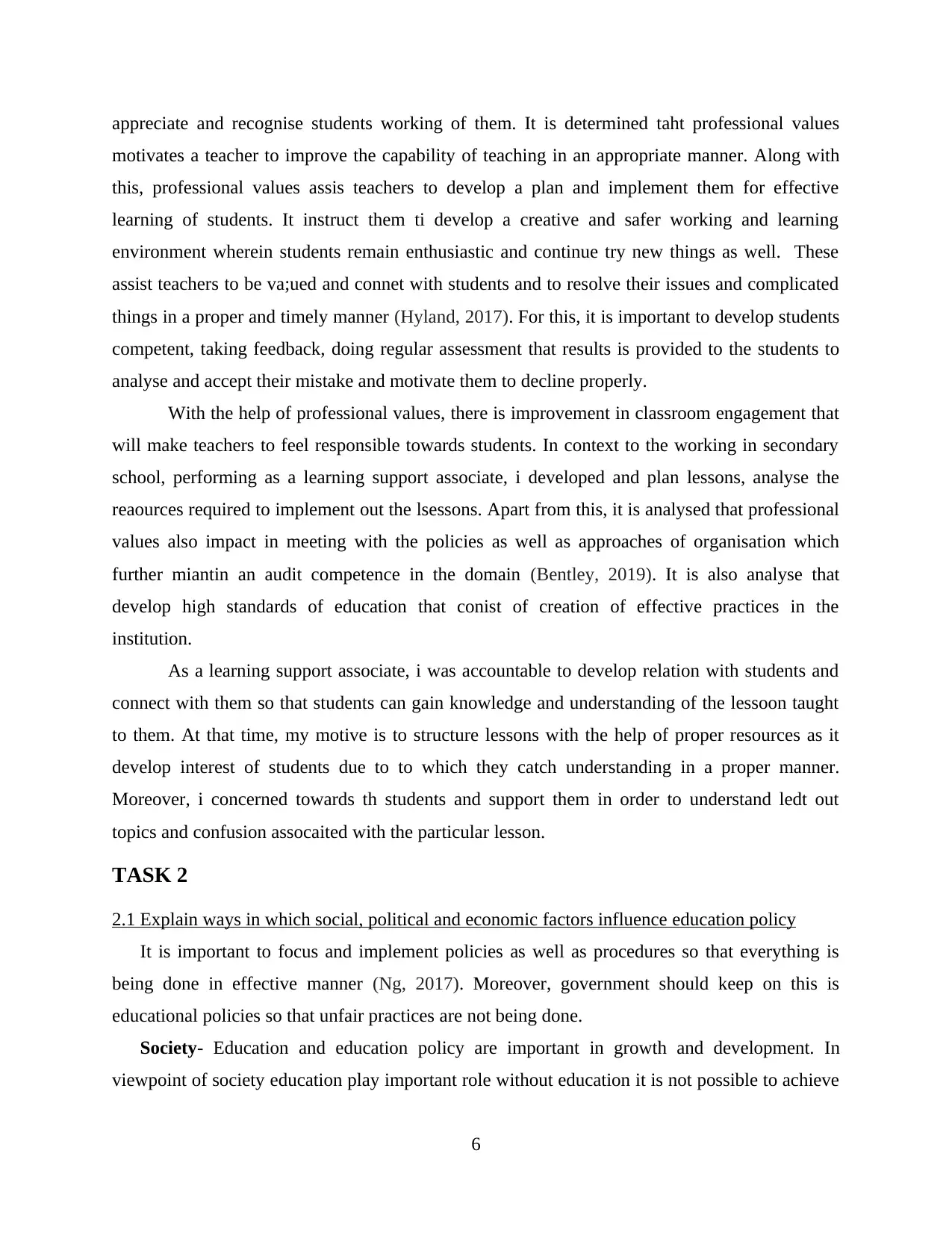
appreciate and recognise students working of them. It is determined taht professional values
motivates a teacher to improve the capability of teaching in an appropriate manner. Along with
this, professional values assis teachers to develop a plan and implement them for effective
learning of students. It instruct them ti develop a creative and safer working and learning
environment wherein students remain enthusiastic and continue try new things as well. These
assist teachers to be va;ued and connet with students and to resolve their issues and complicated
things in a proper and timely manner (Hyland, 2017). For this, it is important to develop students
competent, taking feedback, doing regular assessment that results is provided to the students to
analyse and accept their mistake and motivate them to decline properly.
With the help of professional values, there is improvement in classroom engagement that
will make teachers to feel responsible towards students. In context to the working in secondary
school, performing as a learning support associate, i developed and plan lessons, analyse the
reaources required to implement out the lsessons. Apart from this, it is analysed that professional
values also impact in meeting with the policies as well as approaches of organisation which
further miantin an audit competence in the domain (Bentley, 2019). It is also analyse that
develop high standards of education that conist of creation of effective practices in the
institution.
As a learning support associate, i was accountable to develop relation with students and
connect with them so that students can gain knowledge and understanding of the lessoon taught
to them. At that time, my motive is to structure lessons with the help of proper resources as it
develop interest of students due to to which they catch understanding in a proper manner.
Moreover, i concerned towards th students and support them in order to understand ledt out
topics and confusion assocaited with the particular lesson.
TASK 2
2.1 Explain ways in which social, political and economic factors influence education policy
It is important to focus and implement policies as well as procedures so that everything is
being done in effective manner (Ng, 2017). Moreover, government should keep on this is
educational policies so that unfair practices are not being done.
Society- Education and education policy are important in growth and development. In
viewpoint of society education play important role without education it is not possible to achieve
6
motivates a teacher to improve the capability of teaching in an appropriate manner. Along with
this, professional values assis teachers to develop a plan and implement them for effective
learning of students. It instruct them ti develop a creative and safer working and learning
environment wherein students remain enthusiastic and continue try new things as well. These
assist teachers to be va;ued and connet with students and to resolve their issues and complicated
things in a proper and timely manner (Hyland, 2017). For this, it is important to develop students
competent, taking feedback, doing regular assessment that results is provided to the students to
analyse and accept their mistake and motivate them to decline properly.
With the help of professional values, there is improvement in classroom engagement that
will make teachers to feel responsible towards students. In context to the working in secondary
school, performing as a learning support associate, i developed and plan lessons, analyse the
reaources required to implement out the lsessons. Apart from this, it is analysed that professional
values also impact in meeting with the policies as well as approaches of organisation which
further miantin an audit competence in the domain (Bentley, 2019). It is also analyse that
develop high standards of education that conist of creation of effective practices in the
institution.
As a learning support associate, i was accountable to develop relation with students and
connect with them so that students can gain knowledge and understanding of the lessoon taught
to them. At that time, my motive is to structure lessons with the help of proper resources as it
develop interest of students due to to which they catch understanding in a proper manner.
Moreover, i concerned towards th students and support them in order to understand ledt out
topics and confusion assocaited with the particular lesson.
TASK 2
2.1 Explain ways in which social, political and economic factors influence education policy
It is important to focus and implement policies as well as procedures so that everything is
being done in effective manner (Ng, 2017). Moreover, government should keep on this is
educational policies so that unfair practices are not being done.
Society- Education and education policy are important in growth and development. In
viewpoint of society education play important role without education it is not possible to achieve
6
⊘ This is a preview!⊘
Do you want full access?
Subscribe today to unlock all pages.

Trusted by 1+ million students worldwide
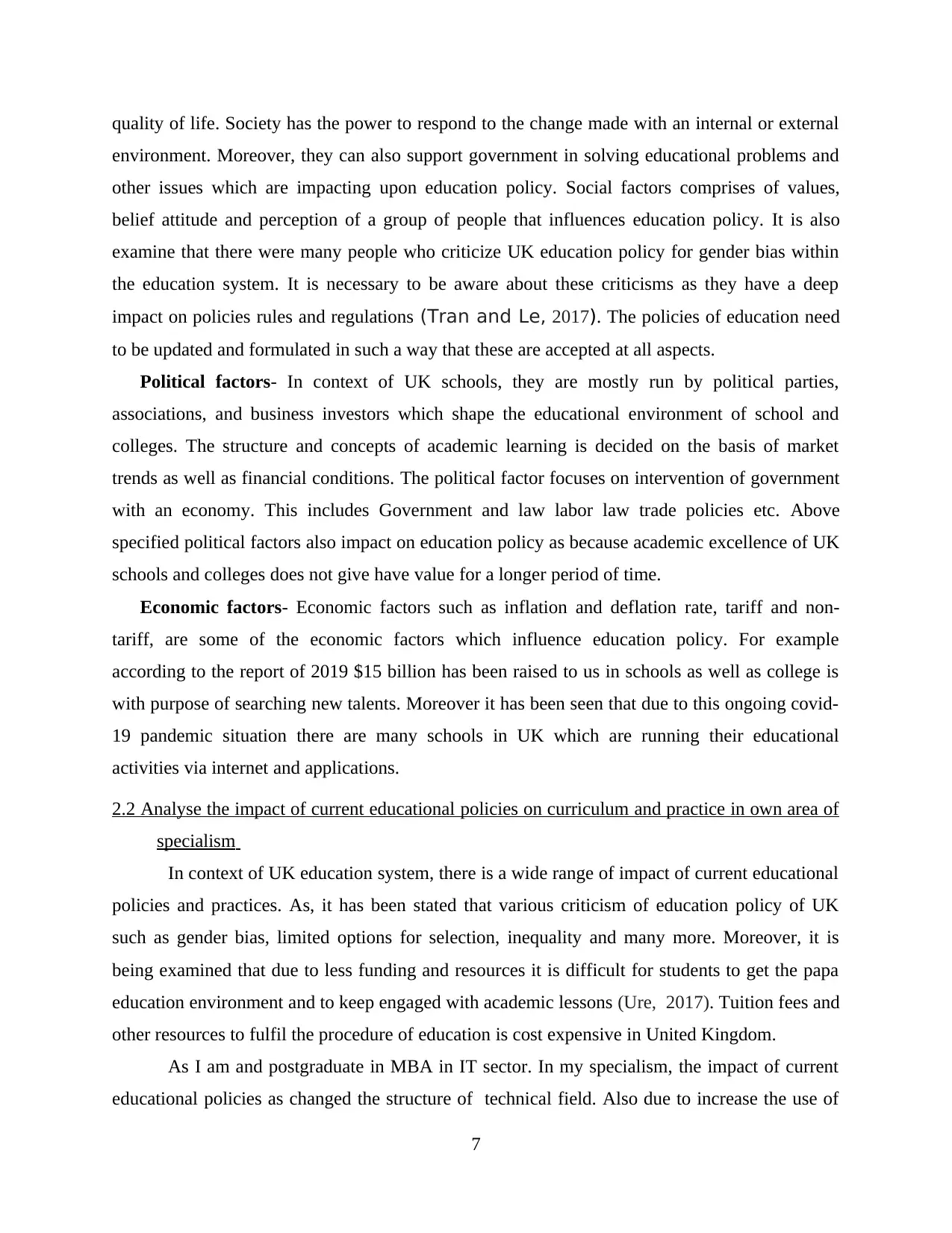
quality of life. Society has the power to respond to the change made with an internal or external
environment. Moreover, they can also support government in solving educational problems and
other issues which are impacting upon education policy. Social factors comprises of values,
belief attitude and perception of a group of people that influences education policy. It is also
examine that there were many people who criticize UK education policy for gender bias within
the education system. It is necessary to be aware about these criticisms as they have a deep
impact on policies rules and regulations (Tran and Le, 2017). The policies of education need
to be updated and formulated in such a way that these are accepted at all aspects.
Political factors- In context of UK schools, they are mostly run by political parties,
associations, and business investors which shape the educational environment of school and
colleges. The structure and concepts of academic learning is decided on the basis of market
trends as well as financial conditions. The political factor focuses on intervention of government
with an economy. This includes Government and law labor law trade policies etc. Above
specified political factors also impact on education policy as because academic excellence of UK
schools and colleges does not give have value for a longer period of time.
Economic factors- Economic factors such as inflation and deflation rate, tariff and non-
tariff, are some of the economic factors which influence education policy. For example
according to the report of 2019 $15 billion has been raised to us in schools as well as college is
with purpose of searching new talents. Moreover it has been seen that due to this ongoing covid-
19 pandemic situation there are many schools in UK which are running their educational
activities via internet and applications.
2.2 Analyse the impact of current educational policies on curriculum and practice in own area of
specialism
In context of UK education system, there is a wide range of impact of current educational
policies and practices. As, it has been stated that various criticism of education policy of UK
such as gender bias, limited options for selection, inequality and many more. Moreover, it is
being examined that due to less funding and resources it is difficult for students to get the papa
education environment and to keep engaged with academic lessons (Ure, 2017). Tuition fees and
other resources to fulfil the procedure of education is cost expensive in United Kingdom.
As I am and postgraduate in MBA in IT sector. In my specialism, the impact of current
educational policies as changed the structure of technical field. Also due to increase the use of
7
environment. Moreover, they can also support government in solving educational problems and
other issues which are impacting upon education policy. Social factors comprises of values,
belief attitude and perception of a group of people that influences education policy. It is also
examine that there were many people who criticize UK education policy for gender bias within
the education system. It is necessary to be aware about these criticisms as they have a deep
impact on policies rules and regulations (Tran and Le, 2017). The policies of education need
to be updated and formulated in such a way that these are accepted at all aspects.
Political factors- In context of UK schools, they are mostly run by political parties,
associations, and business investors which shape the educational environment of school and
colleges. The structure and concepts of academic learning is decided on the basis of market
trends as well as financial conditions. The political factor focuses on intervention of government
with an economy. This includes Government and law labor law trade policies etc. Above
specified political factors also impact on education policy as because academic excellence of UK
schools and colleges does not give have value for a longer period of time.
Economic factors- Economic factors such as inflation and deflation rate, tariff and non-
tariff, are some of the economic factors which influence education policy. For example
according to the report of 2019 $15 billion has been raised to us in schools as well as college is
with purpose of searching new talents. Moreover it has been seen that due to this ongoing covid-
19 pandemic situation there are many schools in UK which are running their educational
activities via internet and applications.
2.2 Analyse the impact of current educational policies on curriculum and practice in own area of
specialism
In context of UK education system, there is a wide range of impact of current educational
policies and practices. As, it has been stated that various criticism of education policy of UK
such as gender bias, limited options for selection, inequality and many more. Moreover, it is
being examined that due to less funding and resources it is difficult for students to get the papa
education environment and to keep engaged with academic lessons (Ure, 2017). Tuition fees and
other resources to fulfil the procedure of education is cost expensive in United Kingdom.
As I am and postgraduate in MBA in IT sector. In my specialism, the impact of current
educational policies as changed the structure of technical field. Also due to increase the use of
7
Paraphrase This Document
Need a fresh take? Get an instant paraphrase of this document with our AI Paraphraser
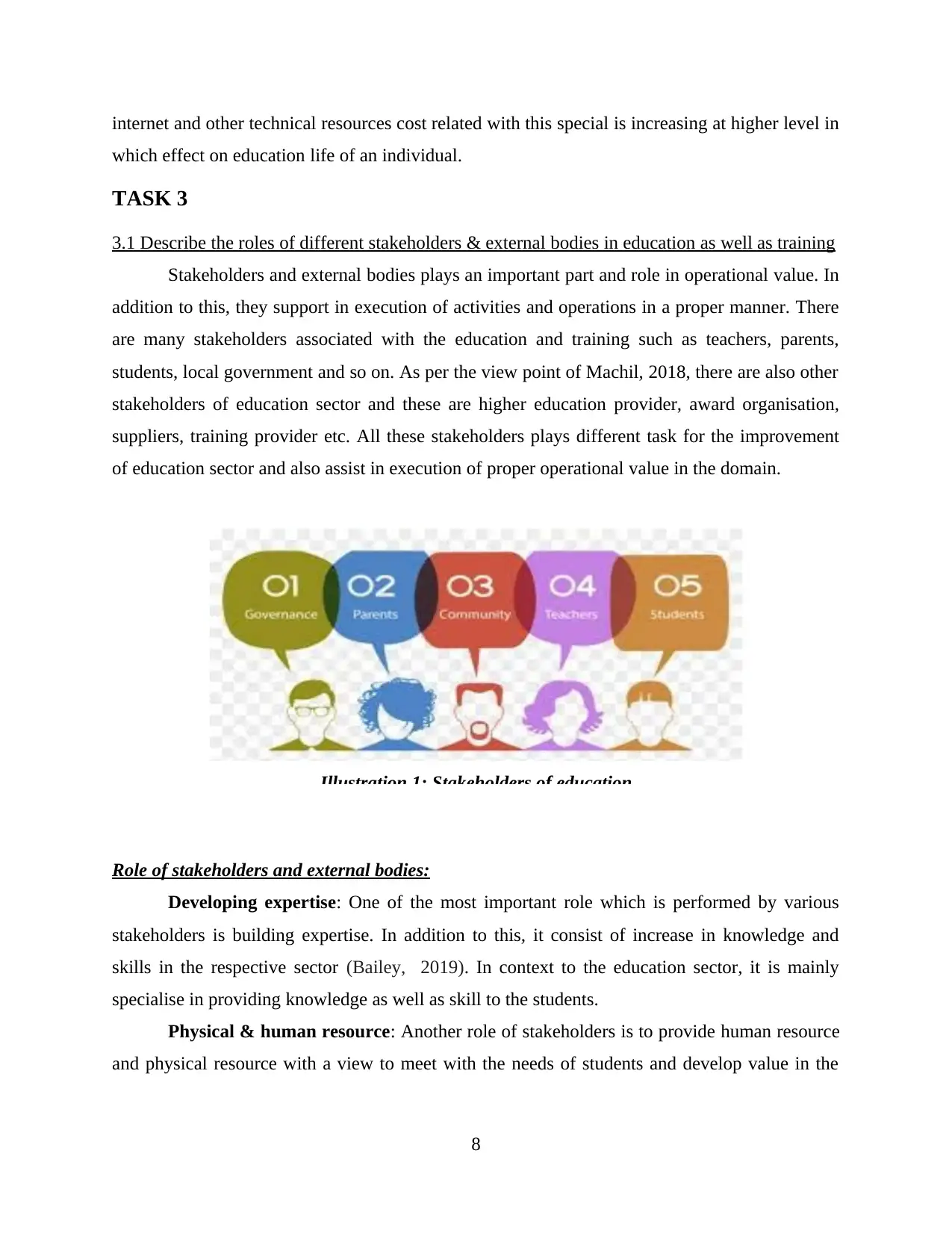
internet and other technical resources cost related with this special is increasing at higher level in
which effect on education life of an individual.
TASK 3
3.1 Describe the roles of different stakeholders & external bodies in education as well as training
Stakeholders and external bodies plays an important part and role in operational value. In
addition to this, they support in execution of activities and operations in a proper manner. There
are many stakeholders associated with the education and training such as teachers, parents,
students, local government and so on. As per the view point of Machil, 2018, there are also other
stakeholders of education sector and these are higher education provider, award organisation,
suppliers, training provider etc. All these stakeholders plays different task for the improvement
of education sector and also assist in execution of proper operational value in the domain.
Role of stakeholders and external bodies:
Developing expertise: One of the most important role which is performed by various
stakeholders is building expertise. In addition to this, it consist of increase in knowledge and
skills in the respective sector (Bailey, 2019). In context to the education sector, it is mainly
specialise in providing knowledge as well as skill to the students.
Physical & human resource: Another role of stakeholders is to provide human resource
and physical resource with a view to meet with the needs of students and develop value in the
8
Illustration 1: Stakeholders of education
which effect on education life of an individual.
TASK 3
3.1 Describe the roles of different stakeholders & external bodies in education as well as training
Stakeholders and external bodies plays an important part and role in operational value. In
addition to this, they support in execution of activities and operations in a proper manner. There
are many stakeholders associated with the education and training such as teachers, parents,
students, local government and so on. As per the view point of Machil, 2018, there are also other
stakeholders of education sector and these are higher education provider, award organisation,
suppliers, training provider etc. All these stakeholders plays different task for the improvement
of education sector and also assist in execution of proper operational value in the domain.
Role of stakeholders and external bodies:
Developing expertise: One of the most important role which is performed by various
stakeholders is building expertise. In addition to this, it consist of increase in knowledge and
skills in the respective sector (Bailey, 2019). In context to the education sector, it is mainly
specialise in providing knowledge as well as skill to the students.
Physical & human resource: Another role of stakeholders is to provide human resource
and physical resource with a view to meet with the needs of students and develop value in the
8
Illustration 1: Stakeholders of education
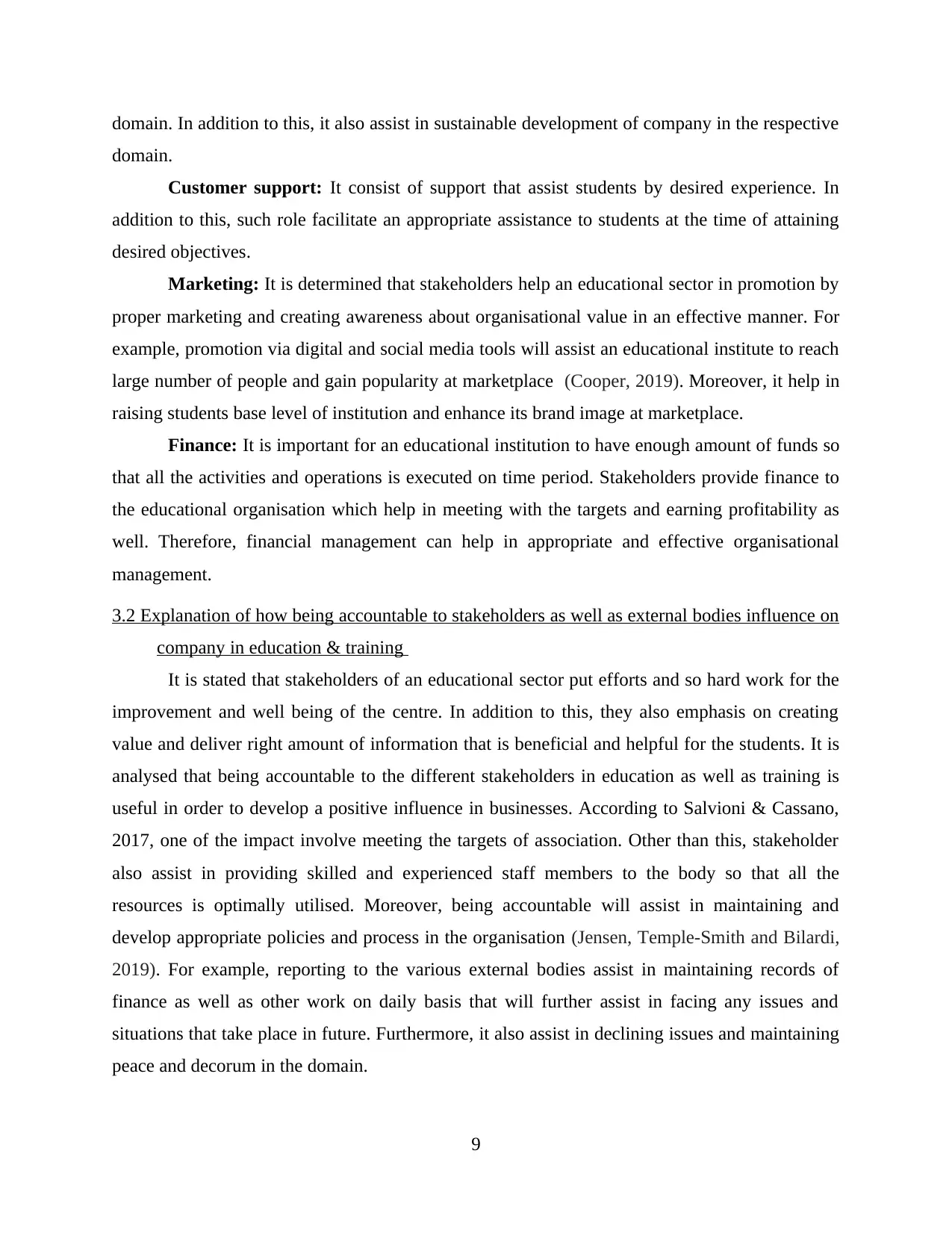
domain. In addition to this, it also assist in sustainable development of company in the respective
domain.
Customer support: It consist of support that assist students by desired experience. In
addition to this, such role facilitate an appropriate assistance to students at the time of attaining
desired objectives.
Marketing: It is determined that stakeholders help an educational sector in promotion by
proper marketing and creating awareness about organisational value in an effective manner. For
example, promotion via digital and social media tools will assist an educational institute to reach
large number of people and gain popularity at marketplace (Cooper, 2019). Moreover, it help in
raising students base level of institution and enhance its brand image at marketplace.
Finance: It is important for an educational institution to have enough amount of funds so
that all the activities and operations is executed on time period. Stakeholders provide finance to
the educational organisation which help in meeting with the targets and earning profitability as
well. Therefore, financial management can help in appropriate and effective organisational
management.
3.2 Explanation of how being accountable to stakeholders as well as external bodies influence on
company in education & training
It is stated that stakeholders of an educational sector put efforts and so hard work for the
improvement and well being of the centre. In addition to this, they also emphasis on creating
value and deliver right amount of information that is beneficial and helpful for the students. It is
analysed that being accountable to the different stakeholders in education as well as training is
useful in order to develop a positive influence in businesses. According to Salvioni & Cassano,
2017, one of the impact involve meeting the targets of association. Other than this, stakeholder
also assist in providing skilled and experienced staff members to the body so that all the
resources is optimally utilised. Moreover, being accountable will assist in maintaining and
develop appropriate policies and process in the organisation (Jensen, Temple‐Smith and Bilardi,
2019). For example, reporting to the various external bodies assist in maintaining records of
finance as well as other work on daily basis that will further assist in facing any issues and
situations that take place in future. Furthermore, it also assist in declining issues and maintaining
peace and decorum in the domain.
9
domain.
Customer support: It consist of support that assist students by desired experience. In
addition to this, such role facilitate an appropriate assistance to students at the time of attaining
desired objectives.
Marketing: It is determined that stakeholders help an educational sector in promotion by
proper marketing and creating awareness about organisational value in an effective manner. For
example, promotion via digital and social media tools will assist an educational institute to reach
large number of people and gain popularity at marketplace (Cooper, 2019). Moreover, it help in
raising students base level of institution and enhance its brand image at marketplace.
Finance: It is important for an educational institution to have enough amount of funds so
that all the activities and operations is executed on time period. Stakeholders provide finance to
the educational organisation which help in meeting with the targets and earning profitability as
well. Therefore, financial management can help in appropriate and effective organisational
management.
3.2 Explanation of how being accountable to stakeholders as well as external bodies influence on
company in education & training
It is stated that stakeholders of an educational sector put efforts and so hard work for the
improvement and well being of the centre. In addition to this, they also emphasis on creating
value and deliver right amount of information that is beneficial and helpful for the students. It is
analysed that being accountable to the different stakeholders in education as well as training is
useful in order to develop a positive influence in businesses. According to Salvioni & Cassano,
2017, one of the impact involve meeting the targets of association. Other than this, stakeholder
also assist in providing skilled and experienced staff members to the body so that all the
resources is optimally utilised. Moreover, being accountable will assist in maintaining and
develop appropriate policies and process in the organisation (Jensen, Temple‐Smith and Bilardi,
2019). For example, reporting to the various external bodies assist in maintaining records of
finance as well as other work on daily basis that will further assist in facing any issues and
situations that take place in future. Furthermore, it also assist in declining issues and maintaining
peace and decorum in the domain.
9
⊘ This is a preview!⊘
Do you want full access?
Subscribe today to unlock all pages.

Trusted by 1+ million students worldwide
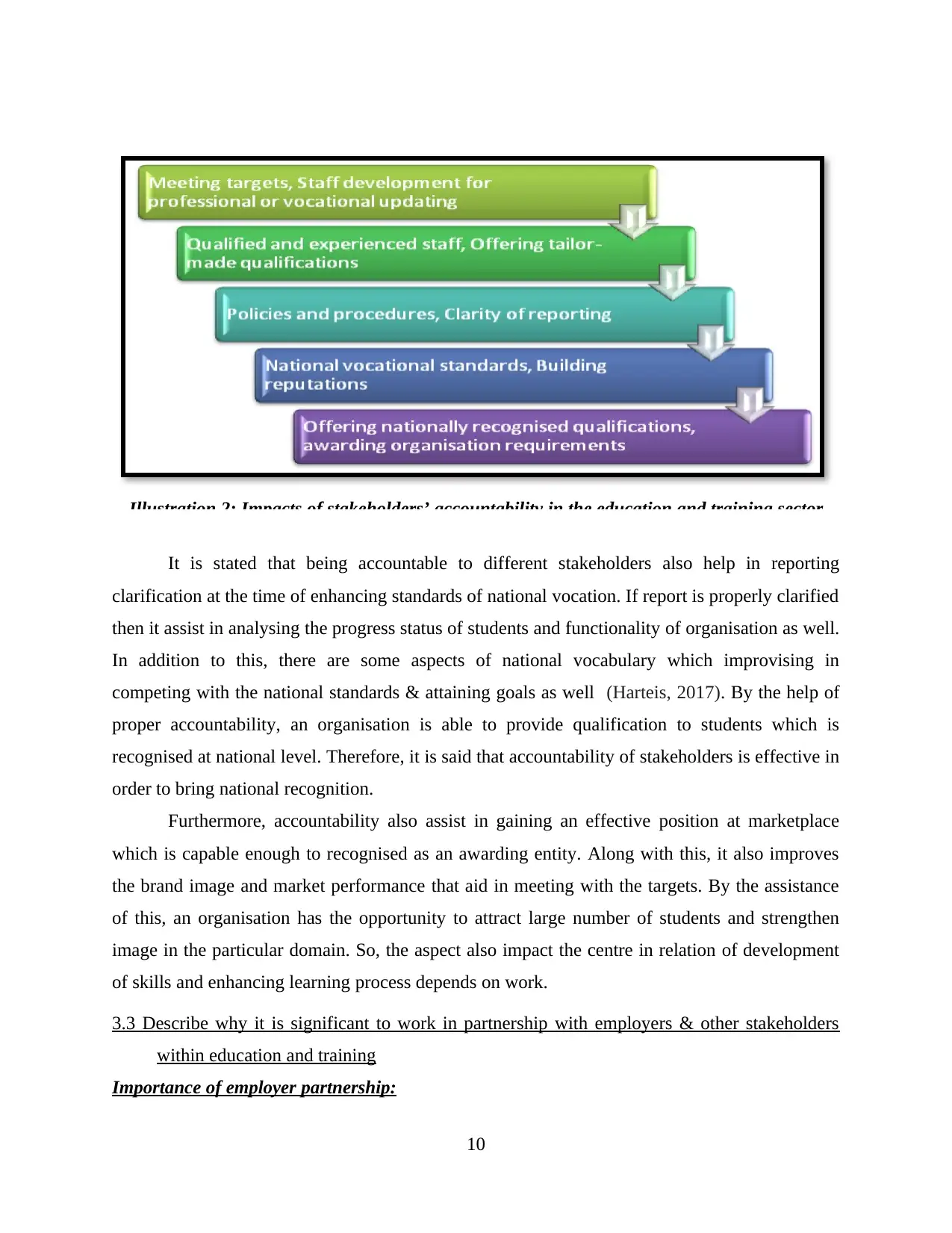
Illustration 2: Impacts of stakeholders’ accountability in the education and training sector
It is stated that being accountable to different stakeholders also help in reporting
clarification at the time of enhancing standards of national vocation. If report is properly clarified
then it assist in analysing the progress status of students and functionality of organisation as well.
In addition to this, there are some aspects of national vocabulary which improvising in
competing with the national standards & attaining goals as well (Harteis, 2017). By the help of
proper accountability, an organisation is able to provide qualification to students which is
recognised at national level. Therefore, it is said that accountability of stakeholders is effective in
order to bring national recognition.
Furthermore, accountability also assist in gaining an effective position at marketplace
which is capable enough to recognised as an awarding entity. Along with this, it also improves
the brand image and market performance that aid in meeting with the targets. By the assistance
of this, an organisation has the opportunity to attract large number of students and strengthen
image in the particular domain. So, the aspect also impact the centre in relation of development
of skills and enhancing learning process depends on work.
3.3 Describe why it is significant to work in partnership with employers & other stakeholders
within education and training
Importance of employer partnership:
10
It is stated that being accountable to different stakeholders also help in reporting
clarification at the time of enhancing standards of national vocation. If report is properly clarified
then it assist in analysing the progress status of students and functionality of organisation as well.
In addition to this, there are some aspects of national vocabulary which improvising in
competing with the national standards & attaining goals as well (Harteis, 2017). By the help of
proper accountability, an organisation is able to provide qualification to students which is
recognised at national level. Therefore, it is said that accountability of stakeholders is effective in
order to bring national recognition.
Furthermore, accountability also assist in gaining an effective position at marketplace
which is capable enough to recognised as an awarding entity. Along with this, it also improves
the brand image and market performance that aid in meeting with the targets. By the assistance
of this, an organisation has the opportunity to attract large number of students and strengthen
image in the particular domain. So, the aspect also impact the centre in relation of development
of skills and enhancing learning process depends on work.
3.3 Describe why it is significant to work in partnership with employers & other stakeholders
within education and training
Importance of employer partnership:
10
Paraphrase This Document
Need a fresh take? Get an instant paraphrase of this document with our AI Paraphraser
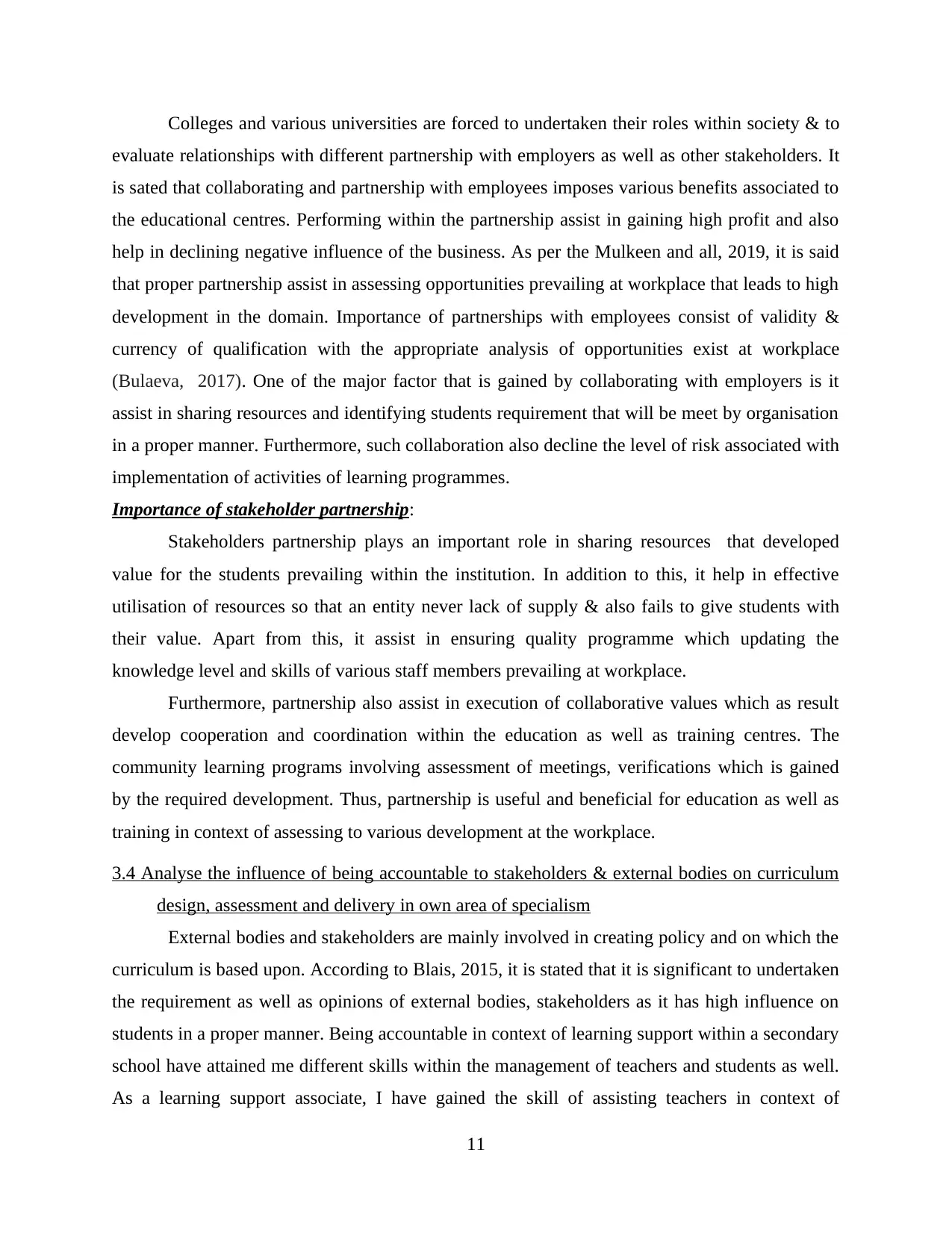
Colleges and various universities are forced to undertaken their roles within society & to
evaluate relationships with different partnership with employers as well as other stakeholders. It
is sated that collaborating and partnership with employees imposes various benefits associated to
the educational centres. Performing within the partnership assist in gaining high profit and also
help in declining negative influence of the business. As per the Mulkeen and all, 2019, it is said
that proper partnership assist in assessing opportunities prevailing at workplace that leads to high
development in the domain. Importance of partnerships with employees consist of validity &
currency of qualification with the appropriate analysis of opportunities exist at workplace
(Bulaeva, 2017). One of the major factor that is gained by collaborating with employers is it
assist in sharing resources and identifying students requirement that will be meet by organisation
in a proper manner. Furthermore, such collaboration also decline the level of risk associated with
implementation of activities of learning programmes.
Importance of stakeholder partnership:
Stakeholders partnership plays an important role in sharing resources that developed
value for the students prevailing within the institution. In addition to this, it help in effective
utilisation of resources so that an entity never lack of supply & also fails to give students with
their value. Apart from this, it assist in ensuring quality programme which updating the
knowledge level and skills of various staff members prevailing at workplace.
Furthermore, partnership also assist in execution of collaborative values which as result
develop cooperation and coordination within the education as well as training centres. The
community learning programs involving assessment of meetings, verifications which is gained
by the required development. Thus, partnership is useful and beneficial for education as well as
training in context of assessing to various development at the workplace.
3.4 Analyse the influence of being accountable to stakeholders & external bodies on curriculum
design, assessment and delivery in own area of specialism
External bodies and stakeholders are mainly involved in creating policy and on which the
curriculum is based upon. According to Blais, 2015, it is stated that it is significant to undertaken
the requirement as well as opinions of external bodies, stakeholders as it has high influence on
students in a proper manner. Being accountable in context of learning support within a secondary
school have attained me different skills within the management of teachers and students as well.
As a learning support associate, I have gained the skill of assisting teachers in context of
11
evaluate relationships with different partnership with employers as well as other stakeholders. It
is sated that collaborating and partnership with employees imposes various benefits associated to
the educational centres. Performing within the partnership assist in gaining high profit and also
help in declining negative influence of the business. As per the Mulkeen and all, 2019, it is said
that proper partnership assist in assessing opportunities prevailing at workplace that leads to high
development in the domain. Importance of partnerships with employees consist of validity &
currency of qualification with the appropriate analysis of opportunities exist at workplace
(Bulaeva, 2017). One of the major factor that is gained by collaborating with employers is it
assist in sharing resources and identifying students requirement that will be meet by organisation
in a proper manner. Furthermore, such collaboration also decline the level of risk associated with
implementation of activities of learning programmes.
Importance of stakeholder partnership:
Stakeholders partnership plays an important role in sharing resources that developed
value for the students prevailing within the institution. In addition to this, it help in effective
utilisation of resources so that an entity never lack of supply & also fails to give students with
their value. Apart from this, it assist in ensuring quality programme which updating the
knowledge level and skills of various staff members prevailing at workplace.
Furthermore, partnership also assist in execution of collaborative values which as result
develop cooperation and coordination within the education as well as training centres. The
community learning programs involving assessment of meetings, verifications which is gained
by the required development. Thus, partnership is useful and beneficial for education as well as
training in context of assessing to various development at the workplace.
3.4 Analyse the influence of being accountable to stakeholders & external bodies on curriculum
design, assessment and delivery in own area of specialism
External bodies and stakeholders are mainly involved in creating policy and on which the
curriculum is based upon. According to Blais, 2015, it is stated that it is significant to undertaken
the requirement as well as opinions of external bodies, stakeholders as it has high influence on
students in a proper manner. Being accountable in context of learning support within a secondary
school have attained me different skills within the management of teachers and students as well.
As a learning support associate, I have gained the skill of assisting teachers in context of
11
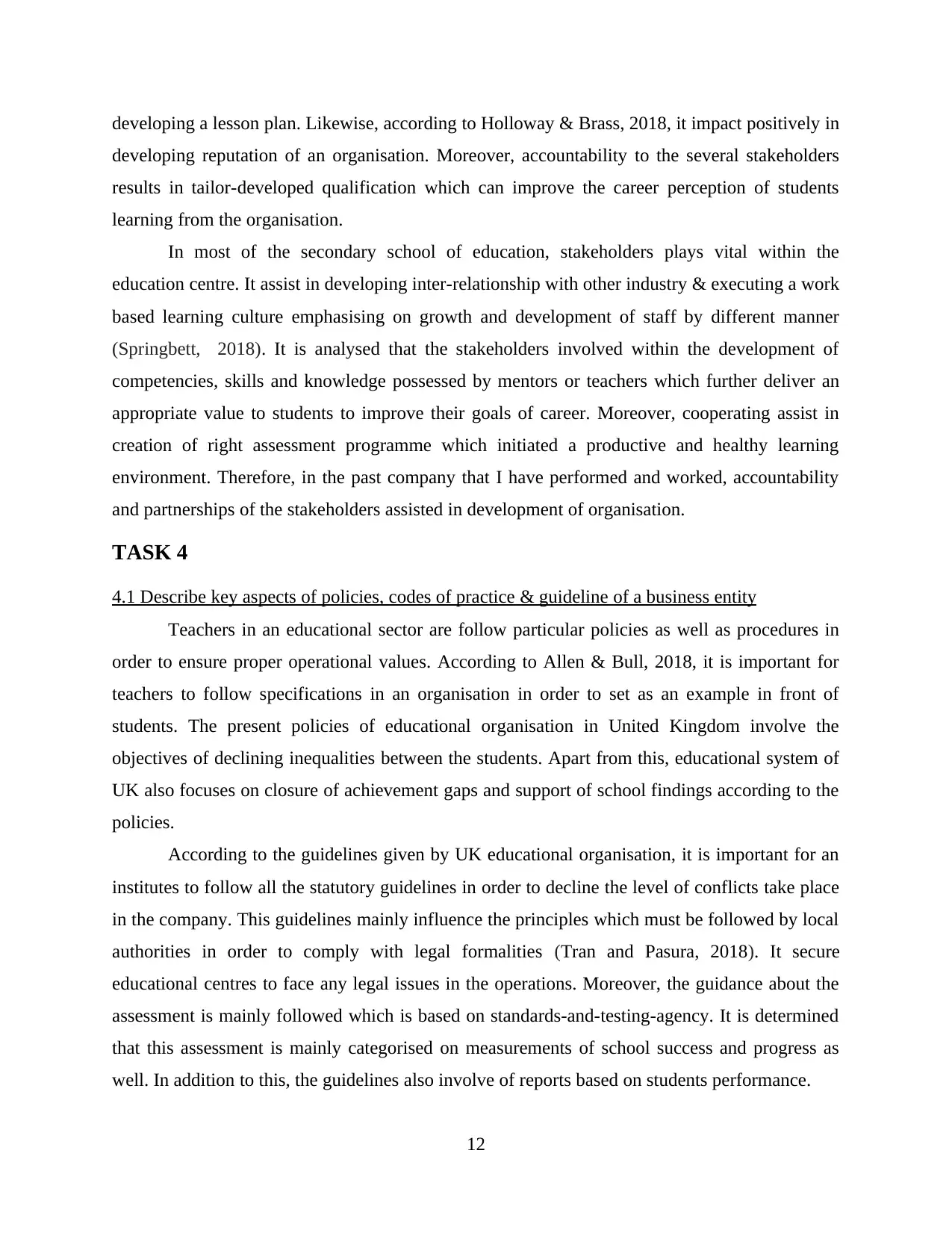
developing a lesson plan. Likewise, according to Holloway & Brass, 2018, it impact positively in
developing reputation of an organisation. Moreover, accountability to the several stakeholders
results in tailor-developed qualification which can improve the career perception of students
learning from the organisation.
In most of the secondary school of education, stakeholders plays vital within the
education centre. It assist in developing inter-relationship with other industry & executing a work
based learning culture emphasising on growth and development of staff by different manner
(Springbett, 2018). It is analysed that the stakeholders involved within the development of
competencies, skills and knowledge possessed by mentors or teachers which further deliver an
appropriate value to students to improve their goals of career. Moreover, cooperating assist in
creation of right assessment programme which initiated a productive and healthy learning
environment. Therefore, in the past company that I have performed and worked, accountability
and partnerships of the stakeholders assisted in development of organisation.
TASK 4
4.1 Describe key aspects of policies, codes of practice & guideline of a business entity
Teachers in an educational sector are follow particular policies as well as procedures in
order to ensure proper operational values. According to Allen & Bull, 2018, it is important for
teachers to follow specifications in an organisation in order to set as an example in front of
students. The present policies of educational organisation in United Kingdom involve the
objectives of declining inequalities between the students. Apart from this, educational system of
UK also focuses on closure of achievement gaps and support of school findings according to the
policies.
According to the guidelines given by UK educational organisation, it is important for an
institutes to follow all the statutory guidelines in order to decline the level of conflicts take place
in the company. This guidelines mainly influence the principles which must be followed by local
authorities in order to comply with legal formalities (Tran and Pasura, 2018). It secure
educational centres to face any legal issues in the operations. Moreover, the guidance about the
assessment is mainly followed which is based on standards-and-testing-agency. It is determined
that this assessment is mainly categorised on measurements of school success and progress as
well. In addition to this, the guidelines also involve of reports based on students performance.
12
developing reputation of an organisation. Moreover, accountability to the several stakeholders
results in tailor-developed qualification which can improve the career perception of students
learning from the organisation.
In most of the secondary school of education, stakeholders plays vital within the
education centre. It assist in developing inter-relationship with other industry & executing a work
based learning culture emphasising on growth and development of staff by different manner
(Springbett, 2018). It is analysed that the stakeholders involved within the development of
competencies, skills and knowledge possessed by mentors or teachers which further deliver an
appropriate value to students to improve their goals of career. Moreover, cooperating assist in
creation of right assessment programme which initiated a productive and healthy learning
environment. Therefore, in the past company that I have performed and worked, accountability
and partnerships of the stakeholders assisted in development of organisation.
TASK 4
4.1 Describe key aspects of policies, codes of practice & guideline of a business entity
Teachers in an educational sector are follow particular policies as well as procedures in
order to ensure proper operational values. According to Allen & Bull, 2018, it is important for
teachers to follow specifications in an organisation in order to set as an example in front of
students. The present policies of educational organisation in United Kingdom involve the
objectives of declining inequalities between the students. Apart from this, educational system of
UK also focuses on closure of achievement gaps and support of school findings according to the
policies.
According to the guidelines given by UK educational organisation, it is important for an
institutes to follow all the statutory guidelines in order to decline the level of conflicts take place
in the company. This guidelines mainly influence the principles which must be followed by local
authorities in order to comply with legal formalities (Tran and Pasura, 2018). It secure
educational centres to face any legal issues in the operations. Moreover, the guidance about the
assessment is mainly followed which is based on standards-and-testing-agency. It is determined
that this assessment is mainly categorised on measurements of school success and progress as
well. In addition to this, the guidelines also involve of reports based on students performance.
12
⊘ This is a preview!⊘
Do you want full access?
Subscribe today to unlock all pages.

Trusted by 1+ million students worldwide
1 out of 20
Related Documents
Your All-in-One AI-Powered Toolkit for Academic Success.
+13062052269
info@desklib.com
Available 24*7 on WhatsApp / Email
![[object Object]](/_next/static/media/star-bottom.7253800d.svg)
Unlock your academic potential
Copyright © 2020–2026 A2Z Services. All Rights Reserved. Developed and managed by ZUCOL.

